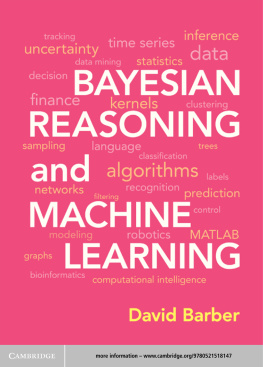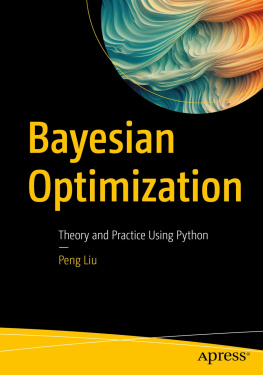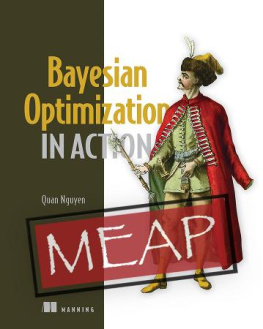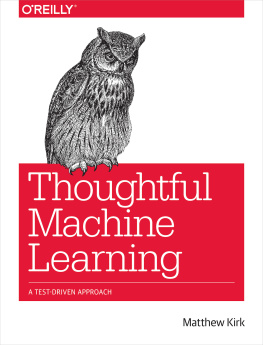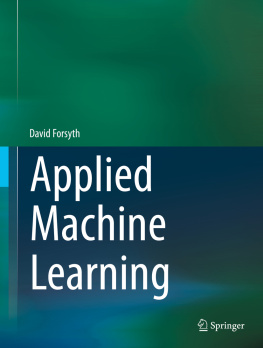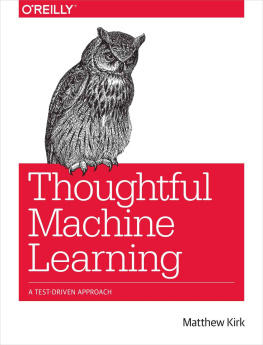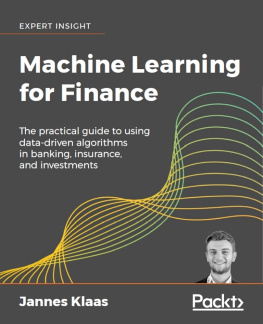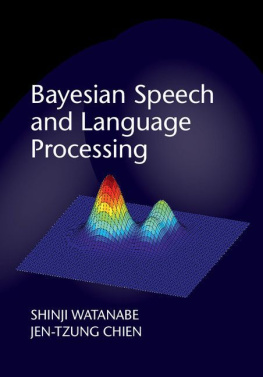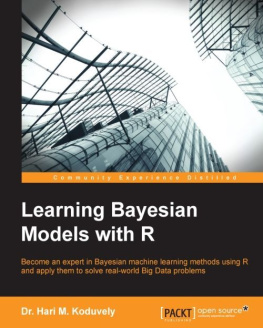David Barber - Bayesian Reasoning and Machine Learning
Here you can read online David Barber - Bayesian Reasoning and Machine Learning full text of the book (entire story) in english for free. Download pdf and epub, get meaning, cover and reviews about this ebook. publisher: Cambridge University Press, genre: Romance novel. Description of the work, (preface) as well as reviews are available. Best literature library LitArk.com created for fans of good reading and offers a wide selection of genres:
Romance novel
Science fiction
Adventure
Detective
Science
History
Home and family
Prose
Art
Politics
Computer
Non-fiction
Religion
Business
Children
Humor
Choose a favorite category and find really read worthwhile books. Enjoy immersion in the world of imagination, feel the emotions of the characters or learn something new for yourself, make an fascinating discovery.
- Book:Bayesian Reasoning and Machine Learning
- Author:
- Publisher:Cambridge University Press
- Genre:
- Rating:5 / 5
- Favourites:Add to favourites
- Your mark:
- 100
- 1
- 2
- 3
- 4
- 5
Bayesian Reasoning and Machine Learning: summary, description and annotation
We offer to read an annotation, description, summary or preface (depends on what the author of the book "Bayesian Reasoning and Machine Learning" wrote himself). If you haven't found the necessary information about the book — write in the comments, we will try to find it.
Bayesian Reasoning and Machine Learning — read online for free the complete book (whole text) full work
Below is the text of the book, divided by pages. System saving the place of the last page read, allows you to conveniently read the book "Bayesian Reasoning and Machine Learning" online for free, without having to search again every time where you left off. Put a bookmark, and you can go to the page where you finished reading at any time.
Font size:
Interval:
Bookmark:
Bayesian Reasoning and Machine Learning
Extracting value from vast amounts of data presents a major challenge to all those working in computer science and related fields. Machine learning technology is already used to help with this task in a wide range of industrial applications, including search engines, DNA sequencing, stock market analysis and robot locomotion. As its usage becomes more widespread, the skills taught in this book will be invaluable to students.
Designed for final-year undergraduate and graduate students, this gentle introduction is ideally suited to readers without a solid background in linear algebra and calculus. It covers basic probabilistic reasoning to advanced techniques in machine learning, and crucially enables students to construct their own models for real-world problems by teaching them what lies behind the methods. A central conceptual theme is the use of Bayesian modelling to describe and build inference algorithms. Numerous examples and exercises are included in the text. Comprehensive resources for students and instructors are available online.
Bayesian Reasoning and Machine Learning
David Barber
University College London

CAMBRIDGE UNIVERSITY PRESS
Cambridge, New York, Melbourne, Madrid, Cape Town,
Singapore, So Paulo, Delhi, Tokyo, Mexico City
Cambridge University Press
The Edinburgh Building, Cambridge CB2 8RU, UK
Published in the United States of America by Cambridge University Press, New York
www.cambridge.org
Information on this title: www.cambridge.org/9780521518147
D. Barber 2012
This publication is in copyright. Subject to statutory exception and to the provisions of relevant collective licensing agreements, no reproduction of any part may take place without the written permission of Cambridge University Press.
First published 2012
Printed in the United Kingdom at the University Press, Cambridge
A catalogue record for this publication is available from the British Library
Library of Congress Cataloguing in Publication data
Barber, David, 1968
Bayesian reasoning and machine learning / David Barber.
p. cm.
Includes bibliographical references and index.
ISBN 978-0-521-51814-7
1. Machine learning. 2. Bayesian statistical decision theory. I. Title.
QA267.B347 2012
006.31 dc23 2011035553
ISBN 978-0-521-51814-7 Hardback
Additional resources for this publication at www.cambridge.org/brml and at www.cs.ucl.ac.uk/staff/D.Barber/brml

Cambridge University Press has no responsibility for the persistence or accuracy of URLs for external or third-party internet websites referred to in this publication, and does not guarantee that any content on such websites is, or will remain, accurate or appropriate.

PREFACE
The data explosion
We live in a world that is rich in data, ever increasing in scale. This data comes from many different sources in science (bioinformatics, astronomy, physics, environmental monitoring) and commerce (customer databases, financial transactions, engine monitoring, speech recognition, surveillance, search). Possessing the knowledge as to how to process and extract value from such data is therefore a key and increasingly important skill. Our society also expects ultimately to be able to engage with computers in a natural manner so that computers can talk to humans, understand what they say and comprehend the visual world around them. These are difficult large-scale information processing tasks and represent grand challenges for computer science and related fields. Similarly, there is a desire to control increasingly complex systems, possibly containing many interacting parts, such as in robotics and autonomous navigation. Successfully mastering such systems requires an understanding of the processes underlying their behaviour. Processing and making sense of such large amounts of data from complex systems is therefore a pressing modern-day concern and will likely remain so for the foreseeable future.
Machine learning
Machine learning is the study of data-driven methods capable of mimicking, understanding and aiding human and biological information processing tasks. In this pursuit, many related issues arise such as how to compress data, interpret and process it. Often these methods are not necessarily directed to mimicking directly human processing but rather to enhancing it, such as in predicting the stock market or retrieving information rapidly. In this probability theory is key since inevitably our limited data and understanding of the problem forces us to address uncertainty. In the broadest sense, machine learning and related fields aim to learn something useful about the environment within which the agent operates. Machine learning is also closely allied with artificial intelligence, with machine learning placing more emphasis on using data to drive and adapt the model.
In the early stages of machine learning and related areas, similar techniques were discovered in relatively isolated research communities. This book presents a unified treatment via graphical models, a marriage between graph and probability theory, facilitating the transference of machine learning concepts between different branches of the mathematical and computational sciences.
Whom this book is for
The book is designed to appeal to students with only a modest mathematical background in undergraduate calculus and linear algebra. No formal computer science or statistical background is required to follow the book, although a basic familiarity with probability, calculus and linear algebra would be useful. The book should appeal to students from a variety of backgrounds, including computer science, engineering, applied statistics, physics and bioinformatics that wish to gain an entry to probabilistic approaches in machine learning. In order to engage with students, the book introduces fundamental concepts in inference using only minimal reference to algebra and calculus. More mathematical techniques are postponed until as and when required, always with the concept as primary and the mathematics secondary.
The concepts and algorithms are described with the aid of many worked examples. The exercises and demonstrations, together with an accompanying MATLAB toolbox, enable the reader to experiment and more deeply understand the material. The ultimate aim of the book is to enable the reader to construct novel algorithms. The book therefore places an emphasis on skill learning, rather than being a collection of recipes. This is a key aspect since modern applications are often so specialised as to require novel methods. The approach taken throughout is to describe the problem as a graphical model, which is then translated into a mathematical framework, ultimately leading to an algorithmic implementation in the BRMLTOOLBOX.
The book is primarily aimed at final year undergraduates and graduates without significant experience in mathematics. On completion, the reader should have a good understanding of the techniques, practicalities and philosophies of probabilistic aspects of machine learning and be well equipped to understand more advanced research level material.
The structure of the book
The book begins with the basic concepts of graphical models and inference. For the independent reader is more advanced, with the remaining material being of more specialised interest. Note that in each chapter the level of material is of varying difficulty, typically with the more challenging material placed towards the end of each chapter. As an introduction to the area of probabilistic modelling, a course can be constructed from the material as indicated in the chart.
Next pageFont size:
Interval:
Bookmark:
Similar books «Bayesian Reasoning and Machine Learning»
Look at similar books to Bayesian Reasoning and Machine Learning. We have selected literature similar in name and meaning in the hope of providing readers with more options to find new, interesting, not yet read works.
Discussion, reviews of the book Bayesian Reasoning and Machine Learning and just readers' own opinions. Leave your comments, write what you think about the work, its meaning or the main characters. Specify what exactly you liked and what you didn't like, and why you think so.

